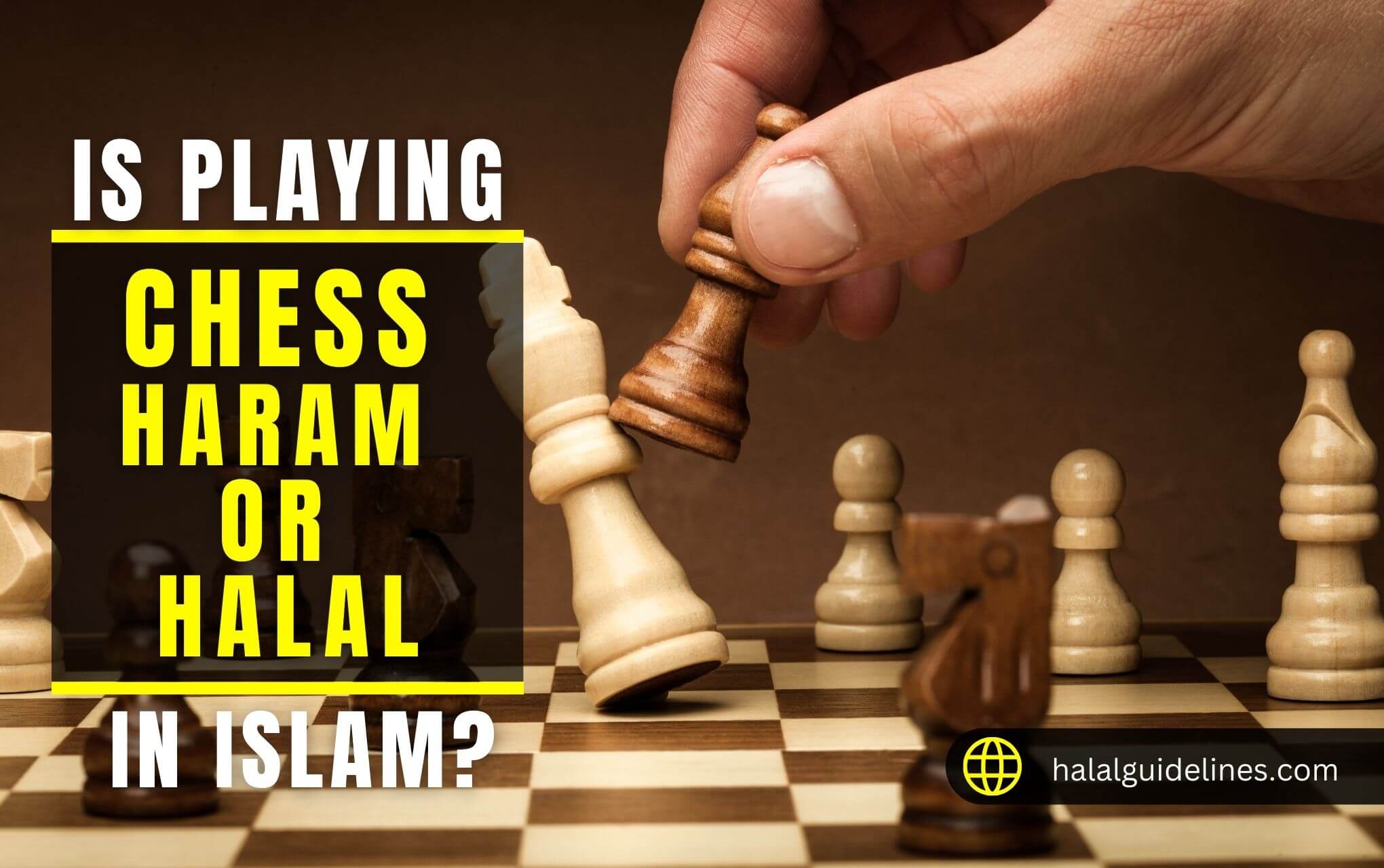Chess is seen as having elements of both, with unpredictable moves and pieces resembling kings and horses. Due to these reasons, it is often likened to gambling and is considered not permissible in Islam. Chess is a game that many people around the world enjoy playing. But in Islamic law, some scholars say it’s not allowed for Muslims, calling it “haram.” This means they believe it’s forbidden because of certain things in the game. Here are simplified reasons for this perspective: Chess involves strategy to outsmart opponents. In Islam, games of chance, like gambling, are forbidden. This is because they are seen as similar to gambling in the teachings. Chess pieces, which represent kings, queens, soldiers, and animals, can be seen as sculptures or idols. In Islamic teachings, there is advice against creating images of living beings. This has raised concerns about the visual aspect of chess pieces, as they depict living things, and some people worry that it goes against these teachings. The mental skill and strategic thinking required for chess may divert attention from important virtues like prayer and spiritual reflection. Some argue that the intense focus on the game could lead to neglect of religious duties. Playing chess for long hours might make it difficult for someone to remember Allah or fulfill their worship duties. Some scholars may see this as a problem because it means that a person is not balancing their priorities well. Big chess competitions give out prizes and important titles, which can make it seem a bit like gambling. Some people worry that the big rewards in top-level chess could be risky and might encourage addictive behavior. Muslims avoid playing chess because certain elements in the game, like chance, imagery, and distracting strategy, are seen as conflicting with Islamic principles. They prefer focusing on sacred studies and activities that align better with their spiritual beliefs. For over 1,500 years, Muslim scholars have discussed chess. Some important figures like Al-Hassan Al-Basri and Ibn Taymiyyah were worried about idolatry and gambling in chess. In the 20th century, scholars like Sayyid Abul Ala Maududi and Muhammad Qasim Nanautawi added concerns about it distracting people from worship. Together, these scholars created a common agreement against playing chess in Islam, leading to strong religious rulings called fatwas. These fatwas advise against playing the game without repentance. They aim to help followers prioritize their faith and formal worship, ensuring they don’t compromise their spiritual journey. Islamic speaker understands the arguments against chess but thinks it’s fine for casual play, not for big competitions with large prizes, which he sees as similar to gambling. Naik allows chess for entertainment and mental growth, as long as people focus on living ethically. Also, he mentions Hazrat Ali (RA) hadith: Hazrat Ali (R.A) when once saw people playing chess and said, “What are you doing? Are you worshipping idols?” Encourages Muslim youth to be moderate, says it’s okay to play chess for improving your mind but warns them not to let it take over their lives. He compares chess to video games and advises against getting too caught up in rankings and tournaments. Al-Hakeem allows playing chess for fun, but he reminds everyone to prioritize religious duties. Al-Hakeem also suggests that if you replace the horse piece in chess with another one, it’s okay to play. This idea fits with his belief in moderation and not letting anything distract from religious responsibilities. He says that if you do it for gambling and missing prayer then it is absolutely haram. He suggests that we should be careful not to get too obsessed with chess competitions. Salah wants Muslims to remember the importance of being moderate and not letting activities like chess become more important than their religious duties and helping the community. He believes in balancing our interests and responsibilities in a way that is ethical and mindful of our religious obligations. He stresses the importance of not missing Salah (prayer time) and advises against getting too involved with games like chess and dice. He suggests that spending too much time on such games might distract individuals from fulfilling their religious obligations, especially Salah. Therefore, it’s crucial to prioritize Salah and not let activities like gaming interfere with religious duties. “وَالَّذِينَ يَجْتَنِبُونَ كَبَائِرَ الْإِثْمِ وَالْفَوَاحِشَ وَإِذَا مَا غَضِبُوا هُمْ يَغْفِرُونَ” Translation: “And those who avoid major sins and abominations, and when they are angry they forgive” (Quran 42:37) Source: The Holy Quran, Surah Ash-Shura (42:37) In this verse of Surah Ash-Shura in the Quran advises people to stay away from big sins and bad things. Some Islamic scholars say that playing chess with pieces that look like living things might be considered wrong because it could be like making idols, which is something Muslims are told not to do in this verse. So, they suggest avoiding games with such pieces to follow the guidance from the Quran. عَنْ مُعَاوِيَةَ رَضِيَ اللَّهُ عَنْهُ قَالَ: قَالَ رَسُولُ اللَّهِ صَلَّى اللَّهُ عَلَيْهِ وَسَلَّمَ: “مَنْ لَعِبَ بِالْمَيْسِرِ فَقَدْ عَصَى اللَّهَ وَرَسُولَهُ” Translation: Mu’awiyah (may Allah be pleased with him) reported: The Messenger of Allah (صلى الله عليه وسلم) said: “Whoever plays chess is like one who dipped his hand in the flesh and blood of swine.” Source: Sahih Muslim 2260 This explicit hadith prohibits games involving chance and gambling, which most scholars agree includes chess due to the unpredictable nature of opponents’ moves. While some Islamic teachings discourage chess, there are plenty of fun activities that are totally fine according to Islamic values. Things like playing checkers, backgammon, solving sudoku puzzles, or doing simple puzzles are great options. Sports like cricket, football, and swimming are also good because they involve skill and exercise, which is healthy and encouraged in Islam. Other activities like painting, ethical business ventures, exploring nature, or volunteering in the community are also great ways to spend time in a positive and meaningful way that aligns with Islamic principles. By choosing harmless activities, we can make sure our free time is well-spent, focusing on personal growth and helping others. When I was younger, I loved playing chess. It was fun and challenging, and I was pretty good at it. But as I grew older, I got into other activities like sports and helping out in my community. I started learning more about the Quran and going to prayer meetings regularly. The more I learned, the more I felt like chess didn’t really fit with what I was learning about being a good Muslim. I went to some talks that talked about having good values and character, and it made me rethink how I spent my time. I realized that spending hours playing chess didn’t really help anyone else or make me a better person. So, instead of playing chess, I started doing things like memorizing the Quran with groups of people, helping out at food drives, and teaching kids about being good people. These activities felt much more meaningful to me, and they matched better with what I believed in as a Muslim. So, I decided to stop playing chess altogether. It was an easy decision once I thought about it like that. Now, I focus on doing things that make a positive impact on others, and it feels really good. I know I’m doing what’s right and trying to make Allah happy. Yes, playing chess without gambling can still be considered haram due to the horse-like knight piece, the risk of wasting time, and potential prayer neglect. It’s best to avoid playing chess together. Playing chess is considered Haram in some interpretations of Islamic teachings due to concerns about potential distractions and similarities to gambling-like activities. In Sunni and Shia Islam, playing chess is seen as not allowed (haram) because it’s thought to go against Islamic rules. Some countries where Shia Islam is common, like Iraq, have even made rules against playing chess.1. Elements of Chance
2. Sculpted Pieces
3. Diverting Focus
4. Not Being Aware of Spiritual Matters
5. High Stakes
1. Dr. Zakir Naik
2. Assim Al-Hakeem
3. Dr. Muhammad Salah
4. Dr. Karim AbuZaid
Quranic Verse on Idolatry of Images
Hadith Explicitly Prohibiting Games of Chance
More Guides for you:
Is Chess Still Remain Haram Without Gambling?
How is Playing Chess Considered Haram in Islamic teachings?
Is playing chess considered haram in Shia Islam?
Is Chess Haram or halal in Islam? Get Clear Answer Here 2025

Yes, In Islam, playing chess is considered haram (prohibited). This belief stems from hadiths that discourage games involving chance and images of living beings (meaning 32 pieces of chess).
5 Reasons Why is Chess Haram According to Islamic Law
Renowned Islamic Scholars Classify Chess as Haram
What Modern-day Scholars about Playing Chess
Quranic Verse and Hadith About the Prohibition of Chess
Looking for Better Games and Hobbies
Letting Go of the Chess Habit for Spiritual Reasons
FAQs






